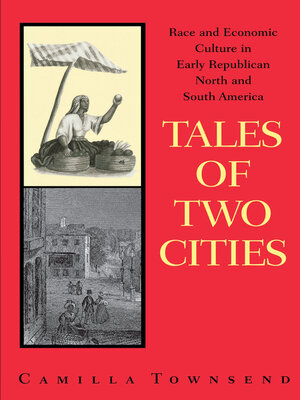Tales of Two Cities
ebook ∣ Race and Economic Culture in Early Republican North and South America
By Camilla Townsend

Sign up to save your library
With an OverDrive account, you can save your favorite libraries for at-a-glance information about availability. Find out more about OverDrive accounts.
Find this title in Libby, the library reading app by OverDrive.



Search for a digital library with this title
Title found at these libraries:
| Loading... |
Parallel histories of workers in two port cities, Baltimore and Guayaquil, illustrate divergent paths in the development of the Americas.
The United States and the countries of Latin America were all colonized by Europeans, yet in terms of economic development, the U.S. far outstripped Latin America beginning in the nineteenth century. Observers have often tried to account for this disparity, many of them claiming that differences in cultural attitudes toward work explain the US’s greater prosperity. In this innovative study, however, Camilla Townsend challenges the traditional view that North Americans succeeded because of the so-called Protestant work ethic—and argues instead that they prospered relative to South Americans because of differences in attitudes towards workers that evolved in the colonial era.
Townsend builds her study around workers’ lives in two similar port cities in the 1820s and 1830s. Through the eyes of the young Frederick Douglass in Baltimore, Maryland, and an Indian girl named Ana Yagual in Guayaquil, Ecuador, she shows how differing attitudes toward race and class in North and South America affected local ways of doing business. This empirical research clarifies the significant relationship between economic culture and racial identity—and its long-term effects.
The United States and the countries of Latin America were all colonized by Europeans, yet in terms of economic development, the U.S. far outstripped Latin America beginning in the nineteenth century. Observers have often tried to account for this disparity, many of them claiming that differences in cultural attitudes toward work explain the US’s greater prosperity. In this innovative study, however, Camilla Townsend challenges the traditional view that North Americans succeeded because of the so-called Protestant work ethic—and argues instead that they prospered relative to South Americans because of differences in attitudes towards workers that evolved in the colonial era.
Townsend builds her study around workers’ lives in two similar port cities in the 1820s and 1830s. Through the eyes of the young Frederick Douglass in Baltimore, Maryland, and an Indian girl named Ana Yagual in Guayaquil, Ecuador, she shows how differing attitudes toward race and class in North and South America affected local ways of doing business. This empirical research clarifies the significant relationship between economic culture and racial identity—and its long-term effects.






